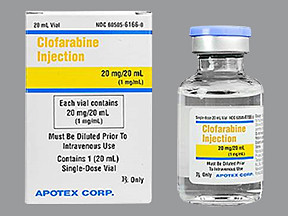CLOFARABINE - INJECTION
PHONETIC PRONUNCIATION: (kloe-FAR-a-been)
COMMON BRAND NAME(S): Clolar
GENERIC NAME(S): clofarabine
Uses
USES: Clofarabine is used to treat a certain type of cancer (acute lymphoblastic leukemia-ALL) in children and young adults ages 1 to 21 whose cancer has not been successfully treated by at least 2 other treatments. It works by stopping the growth of cancer cells.
How to use CLOFARABINE - INJECTION
HOW TO USE: This medication is given by injection into a vein by a health care professional. Drink plenty of fluids to prevent serious problems due to a loss of too much body water (dehydration). Dosage is based on your medical condition, body size, and response to treatment. This medication is usually given over 2 hours once a day for 5 days in a row or as directed by your doctor. A 5-day course of this medication is called a cycle. This cycle is repeated every 2 to 6 weeks depending on your response. Avoid getting the medication on the skin or in the eyes, mouth, or nose. If you do get the medication in those areas, flush with plenty of water and tell your doctor right away.
Side Effects
Precautions
Interactions
Overdose
Images
Reviews
Faq for CLOFARABINE - INJECTION
Clofarabine is used to treat certain types of leukemia and lymphoma.
Clofarabine works by stopping the growth of cancer cells and preventing them from spreading.
Common side effects of clofarabine include nausea, vomiting, diarrhea, fever, infection, rash, and tiredness.
Clofarabine is administered as an injection into a vein by a healthcare professional.
You should inform your doctor about any allergies you have, current medications you are taking, any pre-existing medical conditions, and if you are pregnant or breastfeeding.
The frequency of clofarabine injections will depend on your specific treatment plan, which will be determined by your doctor.
A clofarabine treatment cycle typically lasts about 5 to 7 days.
Yes, clofarabine can interact with certain medications. It is important to inform your doctor about all the medications you are taking to avoid any potential interactions.
You may be at an increased risk of infection while receiving clofarabine, so it is important to follow good hygiene practices and avoid contact with people who have contagious illnesses.
Disclaimer
IMPORTANT: HOW TO USE THIS INFORMATION: This is a summary and does NOT have all possible information about this product. This information does not assure that this product is safe, effective, or appropriate for you. This information is not individual medical advice and does not substitute for the advice of your health care professional. Always ask your health care professional for complete information about this product and your specific health needs.



No Reviews Yet